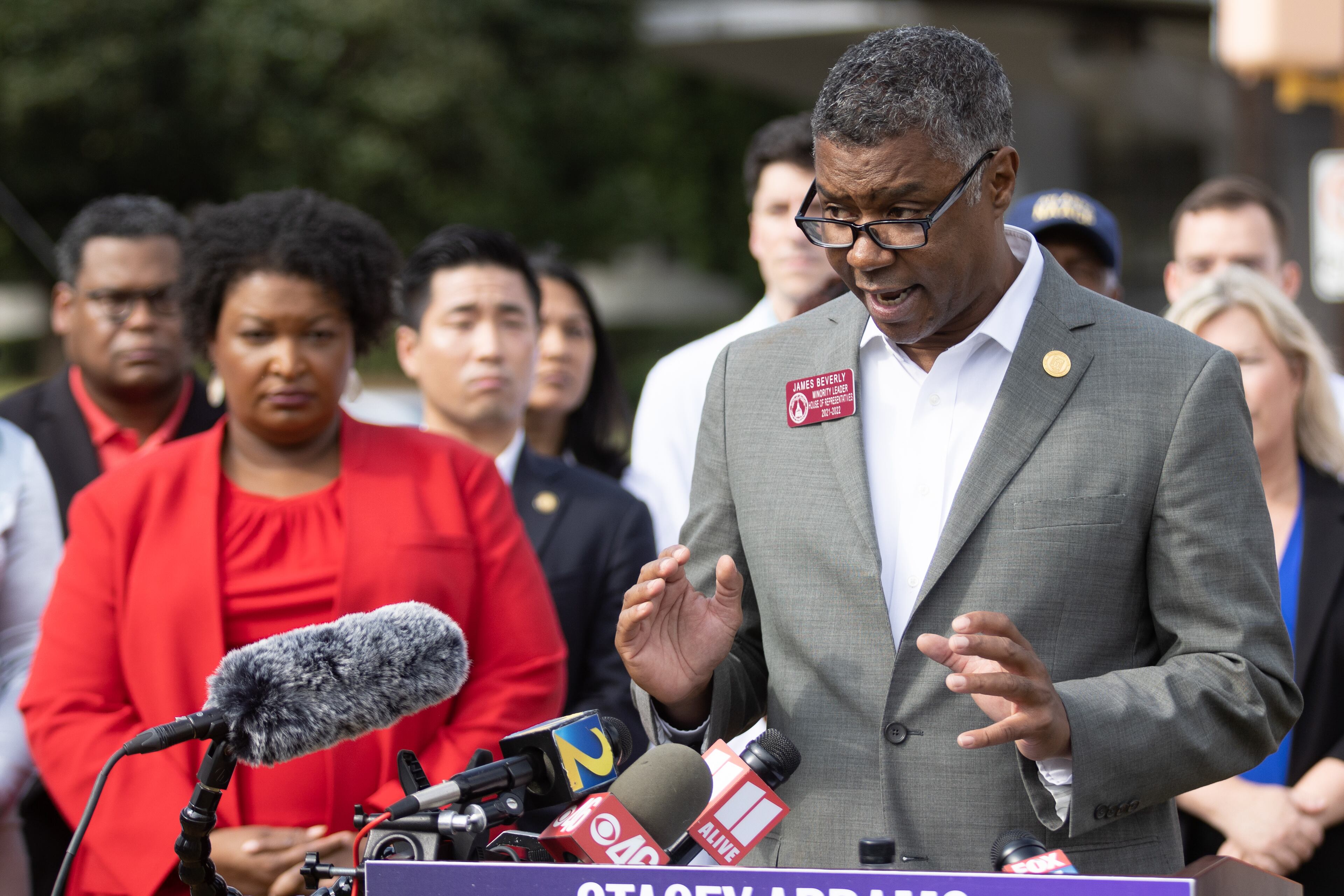How 2024 politics will shape Georgia’s 2023 legislative session

In what would be one of House Speaker David Ralston’s last public appearances, he ventured to a University of Georgia classroom to lay out his vision for the 2023 legislative session. He said it would focus more on consensus-driven policies and less on divisive, “uncivilized” political quarreling.
A few weeks after that September visit, Ralston succumbed to mounting health challenges. But the state’s leaders signal they expect to carry out his vision for 2023 — even as they brace for an unpredictable legislative session in a revamped political landscape.
Long a symbol of continuity under the Gold Dome, Ralston’s death is a key reason the legislative session opens Monday with an air of uncertainty. His successor, Jon Burns, won’t be the only leader trying to find his footing.
Incoming Lt. Gov. Burt Jones, long a backbencher in the state Senate, will preside over the fractious chamber. A class of up-and-coming lawmakers, many untested, replaced tried-and-tested legislative leaders. And dozens of newcomers will take their oaths when the session begins.
“There hasn’t been this type of change at the Legislature in decades. And that’s humbling,” said state Sen. Jason Anavitarte, a Paulding Republican newly elected to a Senate leadership post. “And if we can be intentional and rise above the politics, I believe this General Assembly will do monumental things.”

The constant is Gov. Brian Kemp, who won a mandate after a blowout victory over Democrat Stacey Abrams. But little of his second-term agenda has been defined, and he must navigate a new crop of politicians to push his priorities, starting with a plan to spend a record-setting surplus that tops $6 billion.
He’s likely to set a different tone than in 2022, when campaign politics dictated the action under the Gold Dome. Facing threats from his right and left flanks, Kemp coaxed GOP lawmakers into supporting just about every proposal on his considerable wish list.
Now Kemp has emerged as a political force beyond Georgia, and he must work with new legislative leaders to make good on vows to refund about $2 billion of the surplus to taxpayers and address violent crime.
Georgia legislative session 2023
- 5 bills to watch in the final days of the Georgia legislative session
- Check the status of key legislation: AJC Bill Tracker
- Issues to watch in the 2023 session
- Players to watch in the 2023 General Assembly session
- Georgia Legislative Navigator from the AJC - Track bills, info on legislators
Already, the governor has promised to take aim at “far-left prosecutors” in his second term, signaling plans to endorse legislation that would bring more oversight of district attorneys.
It’s also the first session since the U.S. Supreme Court’s decision to eliminate the constitutional right to abortion, and Republicans are under new pressure from conservative advocates who want to further limit the procedure in Georgia.
State leaders are also facing new demands to address hospital closures after the Atlanta Medical Center shuttered, fresh calls to overhaul Georgia’s landlord rules, renewed scrutiny of the runoff system and a revived push to legalize sports betting.

Democrats, meanwhile, once again face the reality that they can do little to stop a united Republican front in the Legislature.
But House Minority Leader James Beverly, the top Democrat in the chamber, said his party can influence key policies, such as ongoing divides over expanding health care coverage and permitting gambling.
“If we stay focused, we have the opportunity to build on what we learned from last year,” Beverly said. “The leaders are new on their side, and if we can get out of our own way, we can win some of these battles.”
New year, new tests
The new triumvirate of power at the state Capitol will immediately face tests of their leadership skills.
Burns, who is set to win the speaker’s gavel on Monday, was a Ralston deputy who has pledged to maintain his predecessor’s no-frills, conservative style. He retained Ralston’s staff to signal he won’t undertake a dramatic shake-up.
But much about his leadership remains a mystery, starting with his ability to harness a thinner majority than Republicans enjoyed last year to pass key legislation over unified Democratic opposition.

“We don’t know what to expect. Speaker Burns didn’t ruffle a lot of feathers or make a lot of waves before,” said state Rep. Jasmine Clark, a Gwinnett County Democrat. “But we just don’t know what type of leader he’ll be now.”
Jones has an equally tall task. He was relegated to the sidelines by Lt. Gov. Geoff Duncan in recent years and treated delicately by his peers.
Now with a statewide victory under his belt — and well-known aspirations for higher office — he’s under pressure to prove himself as a capable leader. Like Burns, he must also navigate far-right partisans who could try to derail key GOP priorities.
Georgia Republicans promise a contrast from Washington, where disastrous infighting over U.S. House leadership has undermined confidence and left the national party seeming rudderless.

“Certainly there’s a lot of change at the Capitol — but this session will be focused on kitchen table issues like crime, inflation and passing a conservative balanced budget,” said state Rep. Houston Gaines, an Athens Republican who was elected to a House leadership post.
“One thing I can promise,” Gaines said, “is that while Washington continues to look dysfunctional, here in Georgia, we’ll deliver on the issues that matter most.”
‘A whirlwind of a roller coaster’
At the center of the milieu will be Kemp, who enters a second term in a strengthened position.
Four years ago, his victory over Abrams was so slim that the state Democratic Party affixed an asterisk to his name. His relationship with Ralston and other legislative leaders was shaky, and his top priorities stalled in his first years.
Now his sweeping reelection victory has solidified his political power, and last year’s legislative session could prove a model for how he operates going forward.
Republicans in 2022 largely avoided internal bickering and united behind Kemp’s plans to expand gun rights, direct how public schools address race, adopt a $1.1 billion tax refund and allow high schools to ban transgender athletes from competing in women’s sports.
At the urging of Kemp’s allies, they also sidestepped other contentious debates, refusing calls from the party’s far right to adopt stricter abortion limits, implement new obstacles to voting and carve a separate city of Buckhead out of Atlanta’s borders.

Perhaps his biggest challenge will involve deciding how to use the record surplus. He avoided outlining how he’d use the cash even as Abrams promised the money could finance “generational” changes by funding Medicaid expansion and steep pay hikes for state workers.
“Philosophically, we should return some of those dollars to taxpayers,” Anavitarte said. “But we need to be strategic and fiscally responsible in terms of what we’re investing in. We can strike a balance, but we need to do everything we can to help taxpayers reduce their burden.”
The 40-day session will get off to a slower start than normal as lawmakers rearranged the schedule to make way for the college football championship on Monday between the University of Georgia and Texas Christian University.
GOP leaders plan to unveil policy proposals on Wednesday, and Kemp will deliver his inaugural address Thursday. His annual State of the State speech, usually a fixture in the first week, was delayed until Jan. 25. From there, it’s a mystery.
“It’s going to be a whirlwind of a roller coaster,” said Clark, the Democratic legislator. “I hope it’s a good exciting — and not the horrifying kind. We’ll find out soon enough.”




